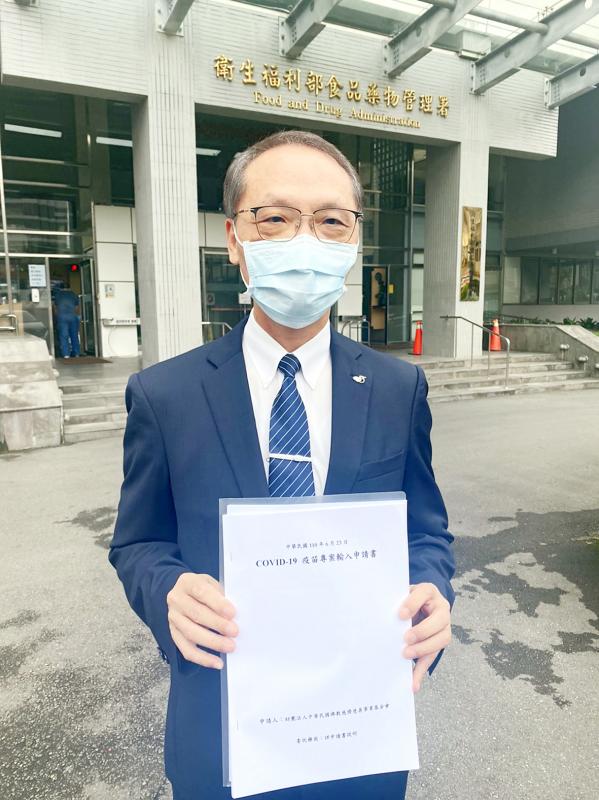The Buddhist Compassion Relief Tzu Chi Foundation’s application to import 5 million doses of the BioNTech COVID-19 vaccine will not be considered alongside similar requests tendered by the Yonglin Foundation and Taiwan Semiconductor Manufacturing Co (TSMC) due to differences in their applications, Executive Yuan spokesperson Lo Ping-cheng (羅秉成) said yesterday.
The Tzu Chi Foundation on Wednesday submitted an application to the Food and Drug Administration (FDA), after the Executive Yuan on Friday last week authorized the YongLin Foundation and TSMC to represent the government to purchase vaccines from BioNTech.
After evaluations, the proposals by TSMC and the YongLin Foundation are more feasible and have a greater “chance” of success, Lo told a news conference at the Executive Yuan in Taipei.

Photo courtesy of the Buddhist Compassion Relief Tzu Chi Foundation
The Tzu Chi Foundation’s application is not being merged with the other two due to differences with each application, he said, without elaborating.
International purchases of vaccines are complicated and it is vital to develop a model that has a greater chance of success, Lo said.
None of the applications included an “authorization notice” from the original manufacturer, BioNTech.
It is rare that the first tender of an application includes a manufacturer’s authorization, FDA Director-General Wu Shou-mei (吳秀梅) said on Wednesday, adding that it would look into the Tzu Chi Foundation’s application and ask it to provide any missing documents.
The Tzu Chi Foundation has said that it cannot obtain the manufacturer’s authorization unless the government first approves its application.
Tzu Chi Foundation executive director Yen Po-wen (顏博文) said that it has followed the government regulations and would do its best to provide whatever documents are required.
Should a purchase proceed, vaccines would be directly imported to Taiwan from Germany, Yen said.
Yen denied a rumor that the Tzu Chi Foundation canceled a news conference to announce its vaccine purchase plan after on Monday receiving a call from the Presidential Office.
Chinese Nationalist Party (KMT) Legislator Wen Yu-hsia (溫玉霞) on Monday made the allegation, although the Presidential Office has denied exerting pressure on the Tzu Chi Foundation.
The Tzu Chi Foundation said that it has three reasons for purchasing BioNTech vaccines.
First, it believes that it is the most effective vaccine against COVID-19; second, the manufacturer can supply sufficient doses in an emergency situation; and third, it is the only vaccine on the market that can be administered to 12 to 17-year-olds.
Vaccine import regulations say that applicants must do so through a pharmaceutical company and application must include eight pieces of documentation: plans and methods of execution; a pharmaceutical insert; the amount imported and why the amount was requested; proof of transport and storage at adequate temperatures; the date of vaccine provision; authorization from the original manufacturer; vaccine expiry dates; and proof of pre-market clearance in foreign countries, the Central Epidemic Command Center said last month.
Additional reporting by Wu Liang-yi

Chinese Nationalist Party (KMT) Chairman Eric Chu (朱立倫), spokeswoman Yang Chih-yu (楊智伃) and Legislator Hsieh Lung-chieh (謝龍介) would be summoned by police for questioning for leading an illegal assembly on Thursday evening last week, Minister of the Interior Liu Shyh-fang (劉世芳) said today. The three KMT officials led an assembly outside the Taipei City Prosecutors’ Office, a restricted area where public assembly is not allowed, protesting the questioning of several KMT staff and searches of KMT headquarters and offices in a recall petition forgery case. Chu, Yang and Hsieh are all suspected of contravening the Assembly and Parade Act (集會遊行法) by holding

PRAISE: Japanese visitor Takashi Kubota said the Taiwanese temple architecture images showcased in the AI Art Gallery were the most impressive displays he saw Taiwan does not have an official pavilion at the World Expo in Osaka, Japan, because of its diplomatic predicament, but the government-backed Tech World pavilion is drawing interest with its unique recreations of works by Taiwanese artists. The pavilion features an artificial intelligence (AI)-based art gallery showcasing works of famous Taiwanese artists from the Japanese colonial period using innovative technologies. Among its main simulated displays are Eastern gouache paintings by Chen Chin (陳進), Lin Yu-shan (林玉山) and Kuo Hsueh-hu (郭雪湖), who were the three young Taiwanese painters selected for the East Asian Painting exhibition in 1927. Gouache is a water-based

Taiwan would welcome the return of Honduras as a diplomatic ally if its next president decides to make such a move, Minister of Foreign Affairs Lin Chia-lung (林佳龍) said yesterday. “Of course, we would welcome Honduras if they want to restore diplomatic ties with Taiwan after their elections,” Lin said at a meeting of the legislature’s Foreign Affairs and National Defense Committee, when asked to comment on statements made by two of the three Honduran presidential candidates during the presidential campaign in the Central American country. Taiwan is paying close attention to the region as a whole in the wake of a

OFF-TARGET: More than 30,000 participants were expected to take part in the Games next month, but only 6,550 foreign and 19,400 Taiwanese athletes have registered Taipei city councilors yesterday blasted the organizers of next month’s World Masters Games over sudden timetable and venue changes, which they said have caused thousands of participants to back out of the international sporting event, among other organizational issues. They also cited visa delays and political interference by China as reasons many foreign athletes are requesting refunds for the event, to be held from May 17 to 30. Jointly organized by the Taipei and New Taipei City governments, the games have been rocked by numerous controversies since preparations began in 2020. Taipei City Councilor Lin Yen-feng (林延鳳) said yesterday that new measures by